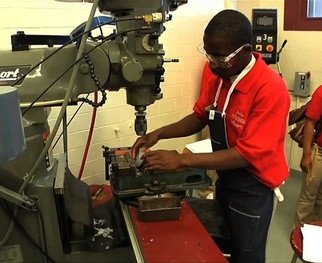(单词翻译:单击)

JEFFREY BROWN:Next: the training of teachers and a new report that concludes too much of that preparation is not adequate.
The study was conducted by the National Council on Teacher Quality, an independent research and advocacy group. The report looked at teaching programs at more than 600 institutions in the U.S., and found what it called an industry of mediocrity.
Among the conclusions: Just one of every four programs restricts admissions for teaching candidates to the top half of college students. And about 70 percent of all programs are not providing elementary teacher candidates with sufficient and current reading training.
But the report's findings and methodology have come under strong criticism.
Our special correspondent for education, John Merrow, joins us now.
John, fill in the picture for us about what this report sees as the problems with training teachers. What kinds of things does it say aren't being done well?
JOHN MERROW:Well, it's very scathing.
It essentially—it argues that teacher—most teacher training institutions don't take training seriously, as if it's not really their mission to train teachers, that they look at it, feel teachers should be a clean slate ready to go in and treat each class as a unique experience.
And, therefore, when they go into their first year of teaching, they're inadequately prepared. And the report is talking about 200,000 men and women who come out of teacher training every year and teach 1.5 million kids during that first year.
We also know that quite often first-year teachers are put with disadvantaged kids. So, it's a double whammy if they're not well-prepared. The report gives stars to—there are 608 institutions that participated or that involved. And only four got four stars, which is the top score. Only four out of 608 got four stars for their programs.
And 162 programs got zero stars; 100 programs got three, three-and-a-half or four stars out of 608; 301 programs got one star. It's a scathing report.
JEFFREY BROWN:Now, but, John, let me just point out, as we said, that there was a lot of pushback here and a lot of criticism of the methodology and even of the point of view of the people who did it.
JOHN MERROW:Absolutely right.
Kate Walsh, who is the head of the National Council of Teacher Quality, is known as a harsh critic of teacher education. And if you go to page 78, to a footnote, you will find that only one percent of teacher training institutions agreed to participate. There was essentially a boycott. Many felt that she began with her conclusions and therefore refused to participate.
That said, in that sense, it's a bad study, because they didn't go to campuses, they didn't sit in on classes, they didn't have the participation. They read course catalogs and syllabi. It's a little bit, Jeff, like going to the doctor for your physical and she says, oh, you don't have to bother coming into the office. Just walk by my window and I will give you your physical.
That sounds terrible, but in this case, the patient, teacher education, is limping and coughing badly, and the doctor probably can say something is wrong.
JEFFREY BROWN:Well, all of this, of course, goes to very real—a very real issue in education you have covered a lot for us. What do we want from teachers? What kind of—how best to train them. What is the right credential for them? The analogy, we hear of law schools and medical schools, I gather has never quite come together.
This is still a real debate, right?
JOHN MERROW:It is still a real debate. And some of the points that the report makes are shocking and also true.
It's very easy to become a teacher. They say that only a quarter of teacher training institutions restrict the admission to the top half of the class. They will take anybody is what she's saying. That has to change. That—states could change that. Now, Kate told me that she hopes this will be a market-driven solution.
The publication of this report, which is a U.S. News publication, she is hoping that people will read that and say, I'm not going to that school. They give stars. They give yellow triangles to institutions that basically say, don't go there. So, her hope, she said to me, is that this will force institutions to change.
She also, I think, expects that there will be alternative ways of training teachers. School districts are creating their own teachers. And there are alternative routes like Teach for America.
So, Randi Weingarten of the teacher union, American Federation of Teachers, has proposed the equivalent of a bar exam for everyone in order to become a teacher.
I think there's some wisdom there. We need to make it harder to become a teacher. But at the same time, we have to make it easier to be a teacher. There's an awful lot of teacher bashing going on. And there are people who see this report as part of that teacher bashing.
JEFFREY BROWN:All right.
Well, John Merrow, a continuing discussion. Thanks so much.
JOHN MERROW:Thank you.


